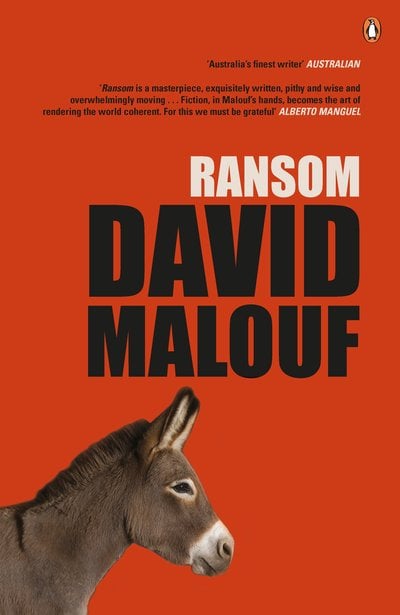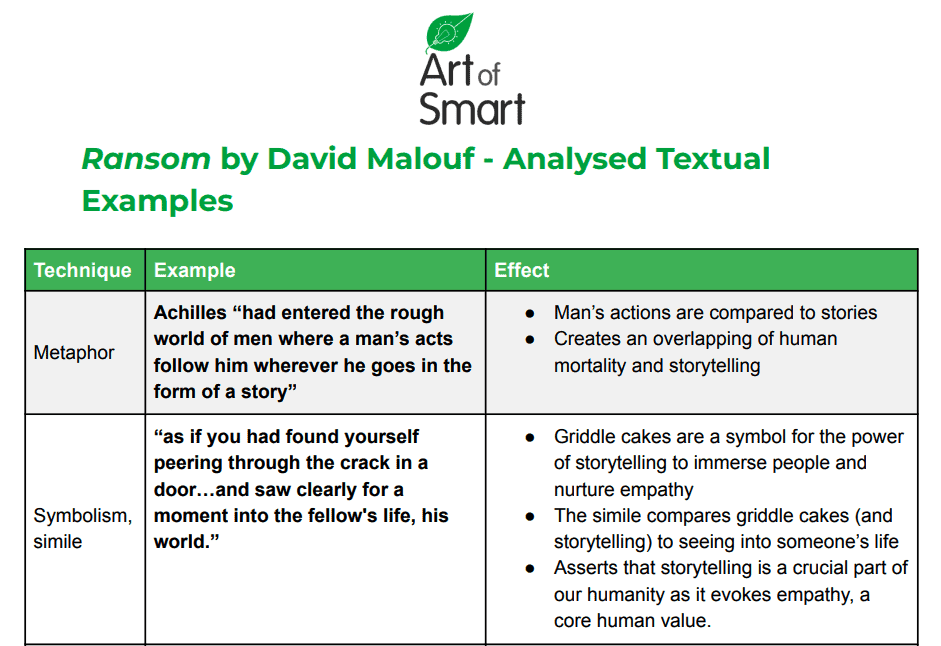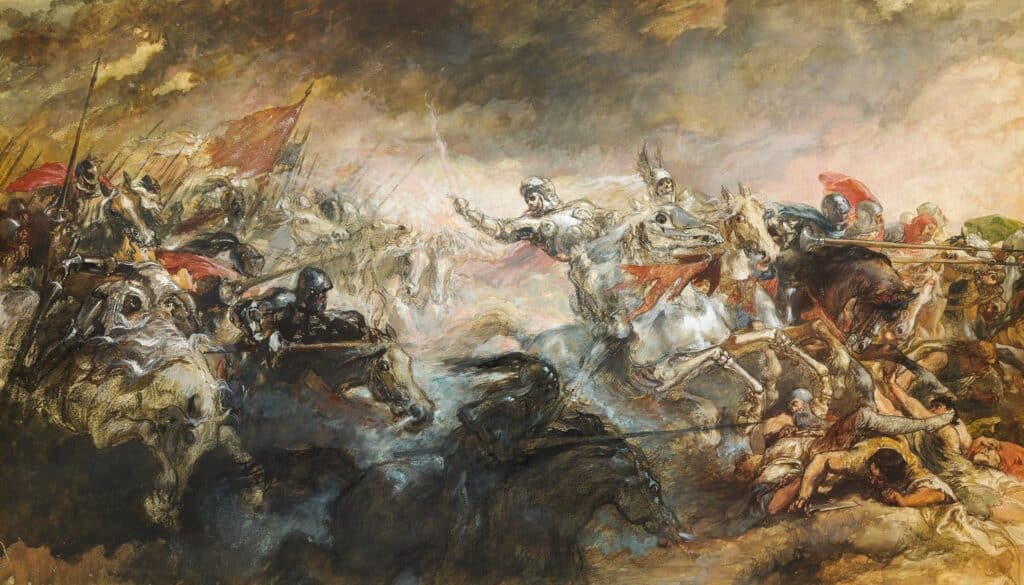Have to write an essay on the book ‘Ransom’ by David Malouf but not sure where to start? Looking for some support to come up with an analysis?
Well, you’ve clicked on the right article! We’ll be walking you through some easy steps on how to analyse the text, including a summary of the book, key ideas, context, and themes.
PLUS we’ll also provide you with a free sample analysis table (also called a TEE Table) and a sample paragraph that you can download!
You’ll be on your way to acing your book analysis of Ransom in no time — let’s jump right in!
Summary of Ransom by David Malouf
Key Characters in Ransom
Context
Themes Explored in Ransom
Book Analysis of Ransom by David Malouf
Book Summary of Ransom by David Malouf
A retelling of Homer’s The Iliad, Ransom is set during the tenth year of the Trojan War.
Part 1
Part 1 starts with Achilles, a demigod and Greek hero, standing by the water thinking about his mother, a water goddess, and his son. He hasn’t seen them since the start of the Trojan War. He also mourns the recent death of his best friend, Patroclus, who grew up with Achilles after he was exiled for accidentally killing a playmate.
Achilles feels partially responsible for his death, because when Achilles had once refused to fight, Patroclus disguised himself in Achilles’ armour and led the Greek army in his place, which led to Patroclus being killed by Trojan prince Hector.
Furious, Achilles kills Hector, who prophesies that Achilles will also face his death soon. But for Achilles, Hector’s death is not enough.
Still enraged and in pain by Patroclus’ death, Achilles ties Hector’s body to his chariot and drags his body back and forth in Troy while his royal family watches on. His anger is worsened since the gods have protected Hector’s corpse from being mutilated.
Part 2
While Achilles mourns the death of his friend, King Priam is mourning the death of his son Hector. His loss makes him reflect on mortality, the futility of life, and the terrible events that have happened under his reign.
Priam’s reflections are interrupted by the goddess Iris, who has appeared to tell Priam that the death of his son and the current situation of Troy is not fate, but rather the result of ‘chance’. As she disappears, Priam has a vision of himself on a mule-drawn cart, carrying a covered load.
He is inspired by the vision and interprets it as a way to give Achilles a ransom in exchange for Hector’s body. He excitedly goes to his wife Hecuba, who is deeply angered and pained by Hector’s death, and shares his vision and hopes of making it a reality.
At first, she is shocked by this idea and highly dismissive of it. She believes that Priam will be killed by Achilles, and also points out that Priam, as royalty, won’t be able to connect with Achilles and reason with him the way an ordinary man might. However, Priam thinks that this is exactly what makes his plan effective, both of them will have a chance to speak as human beings, without additional pressure of being kings and heroes.
He also tells Hecuba a story about how as a child, Priam was almost sold into slavery and only escaped because his sister requested him as her ‘gift’. He describes how because of this experience, he hasn’t felt completely comfortable about his reign, royalty, and status, and feels the need to step away from his role of king and simply live as a man. Hecuba is still unsure about the plan, and asks Priam to finalise his decision after speaking to his children and counsellors.
His children, like Hecuba, are worried about Priam and believe that Priam’s obligation is to stay and support Troy as king. However, Priam once again argues that he should be given an opportunity to experience life as a man rather than a king, because ultimately he too, is subject to the same human mortality as everyone else.
Realising that Priam is determined to make his vision a reality, they agree with his idea and start organising the ransom and a cart. Unlike Priam’s usual royal chariot, they find an ordinary cart for him, pulled by a pretty mule (Beauty) and driven by a man called Somax. As Part 2 comes to an end, Priam and Somax start making their way to the Greek camp.
Part 3
After travelling for a couple of hours, Somax and Priam stop to take a rest near a river, and eat griddle cakes. While they eat, Somax tells stories about the way his daughter-in-law makes the cakes. Priam is surprised by how immersive his stories are, and feels an odd sense of curiosity and imagination, wanting to learn more about Somax’s life.
Happy to share his experiences and stories, Somax continues on to explain how his only granddaughter is currently sick with a fever and his two sons passed away in unfortunate accidents. Hearing his stories, Priam realises that he hasn’t quite experienced loss the way Somax has because he didn’t have many personal memories with his sons.
As night falls, they start their journey again and come across a young Greek soldier, who tells them that he has been sent by Achilles to escort them. As they make their way across the river, Priam realises that the Greek soldier is in fact the Greek god Hermes, who has arrived to guide them to Achilles.
He feels reassured by this, and gains confidence from knowing that the gods support his vision. With the guidance of Hermes, they soon reach the Greek camp.
Part 4
Achilles is in his hut detached from the rest of his men, feeling resentful towards his new attendant, Automedon, who has replaced Patroclus. He suddenly feels the presence of a god and hoping it’s the ghost of Patroclus, turns eagerly.
Instead, it is an old man whom Achilles initially mistakes for his father Peleus and kneels in front of him. Unnerved by this reaction, Priam explains who he is, how he got there, and why he has come. After Achilles confirms this story with Somax, he sends Somax away to have food while Achilles and Priam talk.
When they are alone, Priam appeals to Achilles as a father and encourages Achilles to think of what his father Peleus would do, and also what Achilles himself would do for his son Neoptolemus. He reminds Achilles of their shared mortality and human experience, suggesting that they have empathy and compassion for each other’s losses. Touched by this emotional, personal appeal, Achilles agrees to Priam’s request.
Achilles retrieves Hector’s body, which he finds once again restored by the gods. However, he no longer feels resentment towards Hector and instead, feels a sort of connection and kinship with him. He observes as women prepare the body for the funeral and reflects on life, birth, and death.
After agreeing to an eleven-day truce for Hector’s funeral, Priam finally prepares to leave. Before departing, both men share a dark joke about their rapidly approaching deaths and Achilles tells Priam to call him if and when Troy falls, to which Priam replies that Achilles may not be alive then.
Part 5
As Somax and Priam make their journey back home, they pass by burial mounds and burned down villages. They stop near one of these burned villages and Priam cries in private over Hector’s body.
While he is overwhelmed by grief, Priam also feels revived by the journey and reflects positively on how he has grown and changed. Similarly, in the Greek camp, Achilles trains with newfound energy and feels as though a burden has been lifted from him.
The narrator skips forward to Priam’s death at the hands of Neoptolemus, who is determined to avenge his father and live up to Achilles’s heroic image. However, his death does not go as planned, and Neoptolemus is forced to live with the shame of it for the rest of his life.
The story ends with one final flash forward to an era long after the fall of Troy, where Somax tells stories of his adventures with Priam. However, his listeners don’t believe him and he has earned a reputation of stretching the truth. Instead, they only talk about how Somax once owned a beautiful mule named Beauty.
Key Characters in Ransom
King Priam
Priam is the King of Troy and father of Hector. When we are first introduced to him, Priam is mourning the death of Hector and also worries that without Hector as heir and defender, Troy will fall very soon.
However, after a visit from goddess Iris, he is motivated to gain control over his fate and appeal to Achilles. This decision is largely motivated by Priam’s experience of almost being sold into slavery, which has always made uncomfortable with his royalty.
Achilles
One of the greatest heroes of all time, Achilles is a Greek warrior and demigod (his father is a mortal and his mother a sea goddess). As a result of his demigod status, he often feels uncomfortable in the world of men and longs to be one with his mother’s element, the water.
This split identity is worsened by the death of his closest friend, Patroclus. Achilles tries to take revenge by killing Hector and attempting to mutilate his body, however, Hector’s body is protected by the gods. With no way to express his anger and revenge, Achilles remains in a state of grief and pain until Priam arrives.
As the two talk, Achilles feels a burden being lifted, and responds as a human and father rather than as a hero. Being able to step away from the pressure of being a warrior, Achilles comes to terms with his grief and confronts human mortality and his own soon approaching death.
Somax
Somax is a carter who accompanies Priam to Achilles’s hut. Since he is the only original character in Ransom (a character who is not in The Iliad), Somax is a very unique character. His ordinary life and very down-to-earth personality contrasts the epic, heroic world of both Achilles and Priam.
However, as we reach the end of the narrative, both of them grow to appreciate the ordinary and enjoy being human, without the pressure of being kings or heroes. Somax plays an important role in their character development and transformation.
Hecuba
Hecuba, Queen of Troy, is Priam’s wife and Hector’s mother. She is a devoted wife and mother, who has an intimate bond with her children and has a much closer, personal relationship with them than Priam does. When we first meet her, she is overwhelmed with anger rather than grief, because she is unable to stop Achilles from mutilating her son’s body.
She also initially does not approve of Priam’s plan and believes that his decision may undermine his obligations as a king, and disrupt the overall social order in Troy. However, once she realises that he is determined to make his plan a reality, she supports him wholeheartedly.
Context
Ransom is set during the tenth year of the Trojan War, around 12th or 13th century BCE. The war started when Helen of Sparta, considered the most beautiful woman in the world, was abducted by Paris, Prince of Troy and one of King Priam’s sons.
Heroes from various Greek cities, including Achilles and Odysseus, arrive in Troy to help rescue Helen. While there is ongoing historical debate about whether the Trojan War actually took place or not, ruins of an ancient city much like Troy have been found in modern-day Turkey. However, there is little to suggest that this historical city was like the fictional one described by Homer.
Since Ransom’s historical context is mostly based on Homer’s stories of the Trojan War, thinking about the literary context of David Malouf’s writing is just as important! Homer’s Greek epic The Iliad, which forms the basis for Ransom, was passed down orally for centuries before it was written, and is one of the oldest works of literature in the Western world.
It, along with Homer’s The Odyssey, established and defined the epic genre. As a retelling of The Iliad, David Malouf’s plot, characters, and writing style are inspired by this genre and draws heavily from the origin text.
Themes Explored in Ransom
Here are some important themes explored in Ransom to help you with your analysis:
- Grief
- Leadership
- Mortality and Humanity
- Storytelling and Empathy
- Fate and Chance
How to Analyse Ransom in 3 Steps
Now that you’ve got a solid understanding of the plot and context, you might be tempted to jump straight to writing your thesis. But starting with your analysis is actually better as it can help you build a strong foundation for your essay!
Analysing texts can seem really daunting at first, but we’ll walk you through an analysis of Ransom with some simple steps!
Step 1: Choose your example(s)
Finding good examples is a super important step of analysing texts! Your example is essentially your evidence and can really support your argument.
For this analysis, we’re looking at how Ransom explores the relationship between storytelling, empathy, and humanity.
We’ve chosen the following quotes as our example:
“It was as if you had found yourself peering through the crack in a door…and saw clearly for a moment into the fellow’s life, his world.”
“he had entered the rough world of men where a man’s acts follow him wherever he goes in the form of a story.”
Step 2: Identify your technique(s)
Now that we’ve got our examples, the next step is to find techniques within that example.
The key to finding good techniques is to make sure it supports your ideas and helps you build your argument, it’s not just about finding any old technique! With one or two good, relevant techniques, you can uncover deeper meanings within your examples and add a lot of depth and sophistication to your argument.
For our analysis, the techniques we’ve identified are metaphor and symbolism.
If you’re struggling to find techniques for your text, take a look at our literary techniques cheat sheet here!
Step 3: Carry out your analysis
Once you’ve got your example and techniques, the only thing left to do is to put it all together!
Make sure your analysis focuses on the effect of the techniques and how they support your argument. As you write, flesh out what the example is actually achieving through its techniques, and try linking this to the ideas, themes, and deeper meanings that the composer is trying to express.
This means you need to go beyond simply labelling techniques like this:
David Malouf’s Ransom uses figurative language as the narrator describes how Achilles “had entered the rough world of men where a man’s acts follow him wherever he goes in the form of a story.” This explores the relationship between human experiences, human nature, and storytelling. He further emphasises this by using griddle cakes as a symbol for storytelling and empathy as Priam finds eating griddle cakes and listening to Somax’s stories “as if you had found yourself peering through the crack in a door”.
Instead, try to expand on this and connect your techniques and examples to a broader argument. This might look more like:
Through Ransom, Malouf asserts the relationship between storytelling and humanity. For Malouf, storytelling and imagination become closely intertwined with mortality and the human experience, elucidated through his use of metaphor to describe how Achilles “had entered the rough world of men where a man’s acts follow him wherever he goes in the form of a story”. Ransom also illuminates the relationship between storytelling and humanity by asserting that storytelling is a foundation for core human values such as empathy. Malouf interrogates this power of narratives to nurture human empathy through Priam’s experience of eating griddle cakes while listening to Somax’s stories, which he compares to “as if you had found yourself peering through the crack in a door…and saw clearly for a moment into the fellow’s life, his world.” He uses griddle cakes as a symbol for the immersive quality of storytelling, and its ability to evoke curiosity and empathy. Ransom thus, highlights the relationship between storytelling and humanity.
Need some help analysing other texts?
Check out other texts we’ve created guides for below:
- All the Light We Cannot See
- Lord of the Flies
- Hamlet
- Jane Eyre
- In Cold Blood
- To Kill a Mockingbird
- Amélie
- The Book Thief
- The Tempest
- Blade Runner
- Jasper Jones
- Things Fall Apart
- Mrs Dalloway
Are you looking for some extra help with your book analysis of Ransom by David Malouf?
We have an incredible team of tutors and mentors!
We can help you master your book analysis of Ransom by David Malouf by taking you through the summary, context, key characters and themes. We’ll also help you ace your upcoming English assessments with personalised lessons conducted one-on-one in your home or online!
We’ve supported over 8,000 students over the last 11 years, and on average our students score mark improvements of over 20%!
To find out more and get started with an inspirational tutor and mentor, get in touch today or give us a ring on 1300 267 888!
Maitreyi Kulkarni is a Content Writer at Art of Smart Education and is currently studying a Bachelor of Media and Communications (Public Relations and Social Media) at Macquarie University. She loves writing just about anything from articles to poetry, and has also had one of her articles published with the ABC. When she’s not writing up a storm, she can be found reading, bingeing sitcoms, or playing the guitar.






